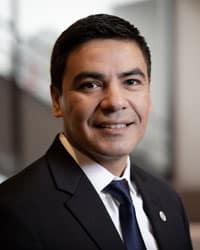On Leadership: Improve your balance with healthy coping strategies

Earlier in my career, I had a very demanding job in finance where leaders were expected to regularly put in 80-plus-hour weeks. Naturally, I did what any self-respecting, overachieving, hyper-responsible perfectionist would do: I worked myself to the bone and neglected everything else.
First, I stopped working out. Then I put my favorite activities – reading, writing, art, hiking, hanging out with family and friends – on the back burner. My sleep eroded. I developed headaches. Eventually, I realized that the very activities I had abandoned were the ones that could actually help with combating stress.
For me, learning to be a healthy and balanced person – and leader – has been an ongoing journey. Of course, a supportive workplace culture and manageable workload is critical. But regardless of the company or position, I have come to accept that there are always going to be some times of intensity, overload or worry at work – simply because the world is constantly changing.
A Forbes article echoes this, saying: “Stress in the workplace is unavoidable. But how leaders manage stress will play a critical part in determining the mental health of their teams.” The article asserts that managers who embrace strategies to handle their own stress will not only be better leaders, but also empathize and advocate for employee mental health and well-being.
As leaders advance, this need for balance intensifies and becomes even more important. It turns out that managing the inevitable stress that comes with the job is an actual leadership skill. There are many ways to combat stress, but developing healthy “extracurricular” coping mechanisms such as exercise, hobbies, enjoying arts and culture, travel, or even just hanging out with friends and family is essential.
Engaging in outside activities may sound like fun and games, but it actually makes a measurable difference in our health. Research cited by MIT’s Sloan Management Review showed that leaders who actively engaged in extracurricular coping strategies saw a 56% reduction in work-related stress.
So, take the time to fit in and enjoy non-work activities; these may just be the key to improving your balance, your health and your life.
I turned to local leaders and asked them why they think it is so important for leaders to prioritize “extracurricular” coping strategies to help maintain balance – and to share examples of a strategy that they are working on.

Ryan Crane, executive director, NAMI Iowa
Enjoying the process is very important: If you want to learn to paint or draw, you may have to experiment and create some less-than-stellar versions along the way. Same for learning an instrument, or trying to read or meditate more. If you do not get some enjoyment out of the day-to-day practice and development of the coping strategy, you probably won’t keep it up.
My extracurricular coping strategy is exercise, and I am always trying to find new ways to change it up. Lately, it has been a brisk daily walk (3-4 miles) with my dog, Donatella. I was not sure if it would be the same “rush” as cardio or lifting, but I was willing to see if I liked it. Now, after most of the spring and summer, we have established a new routine!

Juan Pablo Sanchez, director of inclusive business strategies, Greater Des Moines Partnership
Focusing on coping strategies has been crucial for maintaining balance in my life, providing relief from daily pressures and averting burnout. Early in my career, as a naval officer, I discovered that engaging in activities beyond work duties is vital for building resilience and readiness for new missions. Today, in a completely different role, advancing small businesses in the Greater Des Moines region, this principle continues to hold true. Regular physical exercise seems to be the most effective strategy; it not only enhances physical health but also sharpens mental clarity. Personally, I find that taking time for recreational pursuits, like golfing or fishing, helps me manage pressure. These activities provide a mental escape and foster a sense of accomplishment. Incorporating such strategies in my routine helps me maintain equilibrium, ensuring that I remain productive and prepared for any challenge that comes my way.

Brad Schoenfelder, midwest region president, Ryan Cos.
Leaders must prioritize extracurricular coping strategies to manage the stress and responsibilities of their roles effectively. For me, integrating these strategies has become crucial as my responsibilities have grown. An effective strategy I use is to take annual adventures where I can disconnect. Initially, these trips involved climbing the Grand Tetons and paddling the Upper Iowa River but have since expanded to cultural trips like the Serengeti, hiking in Patagonia, and fishing in the Amazon. These experiences help me mentally sort out urgent tasks and long-term goals.
Additionally, I now prioritize structured time with mentors and family, which helps balance my ambitions with the principle of keeping life “as simple as possible, no simpler.” These practices not only promote resilience but also foster a balanced, holistic approach to daily challenges, ensuring I remain present and calm.

Dr. Teri Wahlig, CEO, ChildServe
It’s not uncommon for me to hit the snooze button and blow off a morning run. Good intentions of fulfilling my goals of improving health, fitness and overall well-being often get pushed to the side and replaced by career responsibilities. Work-life balance is elusive. Instead, I’ve shifted my mindset from a dual perspective of work and life to one of LIFE. My life includes family, faith, work and other activities that nourish my head, heart and soul. I am blessed with a career I love, leading an organization that provides specialty health care for children. As David Bahnsen says in his book “Full-Time”: “It is in work — effort, service, striving — that we discover our meaning and purpose.” Focusing on how work provides tremendous meaning and purpose erases the guilt of skipping that run or neglecting that book I wanted to read. Paradoxically, that creates more time for family, exercise and fun.

Suzanna de Baca
Suzanna de Baca is CEO of Business Publications Corp.





